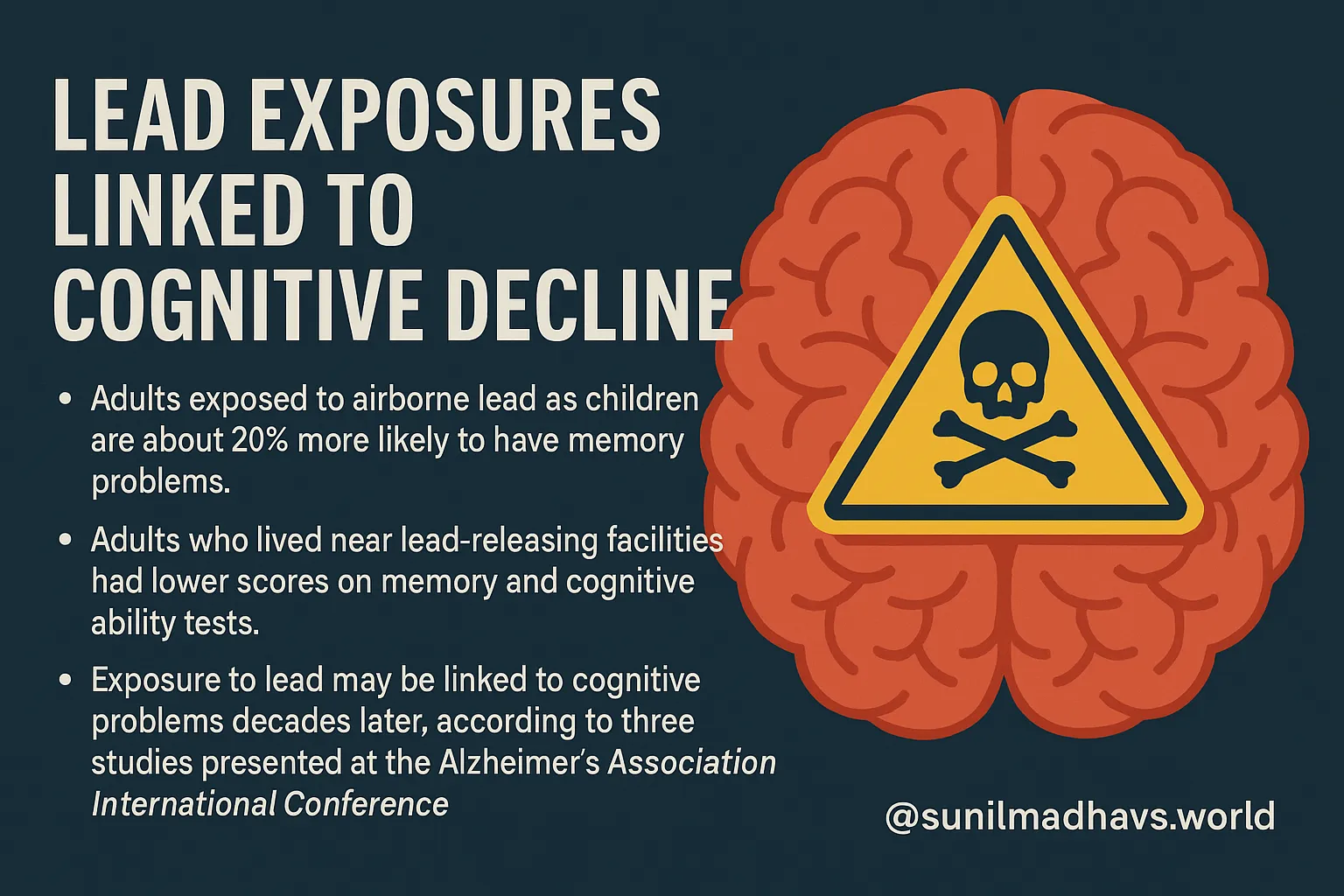Childhood Lead Exposure Linked to Memory Decline and Dementia Risk in Later Life, Studies Show
Three new studies presented at the Alzheimer’s Association International Conference (AAIC) 2025 reveal that exposure to lead — particularly during childhood — may significantly increase the risk of memory impairment and cognitive decline decades later. Researchers say this highlights the long-term neurological consequences of environmental toxins, despite improvements in lead regulation over recent decades.
Key Findings
- Adults who were exposed to airborne lead as children face about a 20% higher risk of memory problems later in life.
- People who lived near lead-emitting industrial facilities as adults displayed worse memory and cognitive scores.
- Laboratory studies found that neurons exposed to lead exhibit lasting dysfunctions and biological hallmarks of Alzheimer’s disease, even after the lead is removed.
Maria C. Carrillo, PhD, Chief Science Officer at the Alzheimer’s Association, emphasized that half of the U.S. population — roughly 170 million people — likely experienced dangerous lead exposure during childhood, primarily from leaded gasoline and industrial emissions. “This underscores how toxic lead remains for brain health well into old age,” Carrillo stated.

1. Leaded Gasoline and Long-Term Memory Problems
One study mapped historic atmospheric lead levels (HALLs) across the U.S. from 1960 to 1974, a period of heavy leaded gasoline use. Based on U.S. Environmental Protection Agency data, researchers classified exposure levels as:
- Low: <0.4 µg/m³
- Moderate: 0.4–0.79 µg/m³
- High: 0.8–1.19 µg/m³
- Extremely High: ≥1.2 µg/m³
Data from over 640,000 U.S. adults aged 65+, collected between 2012 and 2021, revealed that individuals who had lived in areas with HALLs over 0.4 µg/m³ were 17–22% more likely to report memory impairment than those in low-exposure areas.
Eric Brown, MD, MSc, FRCPC, from Toronto’s Centre for Addiction and Mental Health, said these findings suggest lead may contribute to the development of dementia and Alzheimer’s. Esme Fuller-Thompson, PhD, noted that in the 1970s, children’s blood lead levels were 15 times higher than today’s, with 88% exceeding 10 µg/dL — now considered toxic.
The researchers propose that the decline in dementia rates in recent decades may partly reflect the phase-out of leaded gasoline beginning in 1975, which sharply reduced atmospheric lead exposure.
2. Living Near Lead-Releasing Facilities Harms Cognition
Another study assessed 2,409 adults (average age 74; 62% women; 48% Black) from the KHANDLE and STAR cohorts, examining how close they lived to lead-releasing facilities two years before cognitive testing.
Participants lived an average of 6.6 km from a facility, and for each 5-km decrease in distance, researchers observed declines in:
- Verbal episodic memory: –0.07
- Semantic memory: –0.09
Those within 6 km of a facility showed even steeper declines:
- Episodic memory: –0.18
- Semantic memory: –0.27
Kathryn Conlon, PhD, MPH, of the University of California, Davis, warned that even with improved lead control measures, there is no safe level of exposure. Over 7,500 U.S. facilities released lead in 2023, meaning communities remain at risk. Conlon urged residents near such sites to reduce household lead dust through regular cleaning.
3. How Lead Disrupts Brain Cells
In a laboratory study, neurons derived from human-induced pluripotent stem cells were exposed to lead concentrations (15 and 50 ppb). Researchers observed:
- Increased electrical hyperactivity — indicating early neuronal dysfunction.
- Mitochondrial damage — impairing cells’ ability to produce energy.
- Lasting vulnerability to stressors, even after lead removal.
- Elevated levels of phosphorylated Tau, Tau aggregates, and amyloid-beta 42/40 ratios — all key markers of Alzheimer’s disease pathology.
Junkai Xie, PhD, lead researcher from Purdue University, explained that these changes suggest lead exposure may permanently prime the brain for neurodegenerative diseases, making individuals more susceptible to Alzheimer’s later in life.
Overall Implications
The findings from these three studies collectively suggest that lead exposure — whether from childhood gasoline fumes, industrial pollution, or direct neuronal toxicity — can contribute to cognitive decline and Alzheimer’s disease decades later.
Researchers stress that understanding these mechanisms could lead to targeted interventions for individuals at heightened risk and further public health measures to eliminate residual lead exposure.


